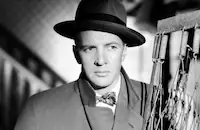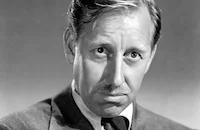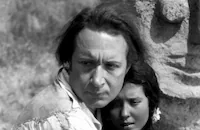The Man I Love

Brief Synopsis
Cast & Crew
Raoul Walsh
Ida Lupino
Robert Alda
Andrea King
Martha Vickers
Bruce Bennett
Film Details
Technical Specs

Synopsis
Singer Petey Brown leaves New York to spend the Christmas holidays with her sisters, Sally Otis and Virginia Brown, and her brother Joey in Long Beach, California. To support her husband Roy, an ex-soldier who is recovering from a nervous breakdown, and her son Buddy, Sally works as a waitress in a restaurant owned by the lecherous Nicky Toresca. Although Toresca's uncle Tony warns his nephew away from Sally, he persists in his pursuit of her. Shortly after Petey arrives, Joey, who works for Toresca, brings Sally an expensive evening gown as a gift. When Sally learns it was purchased by Toresca, she angrily demands that Joey return it. Seeing the difficulties facing her sister, Petey decides to stay in town with her for a while. She wears the dress to Toresca's nightclub and talks her way into a singing job there. Ginny, meanwhile, has a crush on Johnny O'Connor, who lives across the hall from them with his irresponsible wife Gloria and their twins. One night, before Petey's number, Riley, Toresca's right-hand man, tells her that Joey has been arrested. Petey hurries to the police station to bail him out and learns that he blames a man named San Thomas for starting the fight that got him arrested. Angry at her brother's irresponsible actions, Petey bails San out of jail. Although Petey is clearly taken with San, he leaves after thanking her. After Petey returns to the club, she sees Gloria there with another man. Toresca wangles an introduction to Gloria and offers her a job at the club. Later Toresca takes Petey to a little jazz club, where she again meets San and learns that he is a jazz pianist who stopped performing and joined the Merchant Marines after his wife left him. Petey and San begin an affair, but one day, San's wife comes to town, and he tells Petey that he still loves her. Petey angrily asks San to leave, and he does after returning the money she spent on his bail. Meanwhile, Toresca has started an affair with Gloria, but when Johnny comes looking for her, Toresca asks Joey to take her home. Joey is reluctant, knowing Johnny's temper, but manages to get a drunken Gloria into the car. On the way home, however, she jumps out and is killed by an oncoming car. When Joey tells Toresca what happened, Toresca lets him know that he will have to take the blame for Gloria's death. Hearing this, Petey confronts Toresca, and he agrees to keep quiet if she will return to him. Even though she is still in love with San, Petey accepts his terms. Shortly after, Johnny comes gunning for Toresca. Petey wrestles the gun away from Johnny, and informs Toresca that she will tell the police everything. By the time Joey and Petey return to Sally's, Roy has come home from the hospital, and now that her family's problems seem sorted out, Petey decides to leave town. She sees San off to his new assignment in the Merchant Marines, and without promising her anything, San says he will return.

Director

Raoul Walsh
Cast

Ida Lupino

Robert Alda

Andrea King

Martha Vickers

Bruce Bennett

Alan Hale

Dolores Moran

John Ridgely

Don Mcguire

Warren Douglas

Craig Stevens
Tony Romano

Florence Bates
Patrick Griffin
Eddie Bruce
Ed Featherstone
Sailor Vincent
Tom Quinn
Frank Marlowe
Barbara Brown
David Marshall
John Sheridan
Robin Raymond
Janet Barrett
William Edmunds
Ralph Peters
Joe Devlin
Benny Burt

Frank Ferguson
Jack Wise
James Dobbs
Jane Harker

Jack Mower
Fred Kelsey
Paula Drew

Patricia White
Helen Pender
Nancy Brinckman
John Vosper
Ben Welden
Lennie Bremen
Jack Daley
Carl Harbough
Dorothy Vaughn

Monte Blue
Crew
Arnold Albert
Milo Anderson
Harry Barndollar
Russell Collings
Henry Creamer
Gordon M. Davis
Edwin Du Par
Eddie Edwards
Stanley Fleischer
Leo F. Forbstein
Charles David Forrest
David Forrest
Hugo Friedhofer
Reggie Gallow
George Gershwin
Ira Gershwin
John W. Green
Oscar Hammerstein Ii
Sid Hickox
James P. Johnson
Michael P. Joyce
Jerome Kern
Peg Lacentra
Owen Marks
E. Kenneth Martin
John Maxwell
Jo Pagano
Max Steiner
Dolph Thomas
Ray Turner
Catherine Turney
Catherine Turney
Bertram Tuttle
Jack L. Warner
Perc Westmore
P. G. Wodehouse

Film Details
Technical Specs

Articles
The Man I Love
Based on a novel called Night Shift by Maritta Wolff, the movie's screenplay originally bore that title and was set to star Ann Sheridan and Humphrey Bogart. Script rewrites led to a new title, Why Was I Born?, before Warner Brothers finally settled on The Man I Love, both of which are names of George and Ira Gershwin songs which crop up in the picture. The story, a romantic melodrama, finds Ida Lupino as a New York nightclub singer who travels to California to visit her sisters and brother. She decides to stay awhile and lands a job in Robert Alda's nightclub, where her sister also works. As the shady Alda tries to seduce the naïve sister, Lupino falls for her married pianist (Bruce Bennett).
The Breen Office wasn't happy with certain elements of the script. They objected to the story's "low moral tone...of adultery and illicit sex" and found many specific touches that had to go, such as a reference to a slot machine, a suggestion that a cop was crooked, and scenes that "encroach too closely on the intricacies of married life."
But The Man I Love is not a film which thrives on plot. Atmosphere is everything here. The late-night jam sessions, underworld characters and steamy songs all make for a memorably moody experience. (That's probably what attracted Martin Scorsese, who called this film the main inspiration for his New York, New York, 1977.) The Gershwin songs, aside from the title track, include "Body and Soul," "Why Was I Born?," "Bill" and "Liza." Lupino's singing voice is dubbed by Peg La Centra.
Lupino biographer William Donati has written that the actress was suffering from exhaustion while making this film in the summer of 1945. She tended to arrive late on set, and for a short time was even bedridden. The blistering summer heat didn't help. While shooting a scene with Alda one day, she fainted; Alda caught her just before she hit the pavement. According to Donati, Lupino's dress was so tight-fitting that it "had to be snipped off to revive her."
Production moved at a snail's pace due to Lupino's condition, as well as to constant script revisions and to the fact that everyone on set was distracted by war news - especially news of the atomic bomb. When shooting mercifully came to a close, The Man I Love was 19 days behind schedule and $100,000 over budget. Lupino threw a big wrap party for the entire crew and "insisted on dancing at least once with all the men, until she twisted her ankle. She was sidelined for weeks on crutches." (Donati)
Critics were mixed to negative ("a brittle sex romance" is how Variety described it), but The Man I Love touched something in filmgoers and became a big hit. As author Donati has written, "Lupino fans, especially women, lined up to see it. When hard-edged Petey Brown, tough but emotionally vulnerable, finds herself alone when her man sails to sea, a responsive chord was struck in many a woman's heart."
Producer: Arnold Albert, Jack L. Warner
Director: Raoul Walsh
Screenplay: Jo Pagano, Catherine Turney, W.R. Burnett, Maritta Wolff (novel)
Cinematography: Sidney Hickox
Film Editing: Owen Marks
Art Direction: Stanley Fleischer
Music: Max Steiner
Cast: Ida Lupino (Petey Brown), Robert Alda (Nicky Toresca), Andrea King (Sally Otis), Martha Vickers (Virginia Brown), Bruce Bennett (San Thomas), Alan Hale (Riley).
BW-96m.
by Jeremy Arnold

The Man I Love
Quotes
Hey, O'Connor. What kind of vitamins do you use?- Petey Brown
I kind of go for that dress you're wearing.- Nicky Toresca
I was afraid of that when I put it on.- Petey Brown
Yeah, I'm so dangerous that I oughta be wearing a red lantern. All my life, it's been cherchez la femme.- Riley
Cherchez la femme?- Gloria O'Connor
Yeah, that's French for get 'em while they're young.- Riley
I ran down like a clock. It was just as though I'd been wound up too tight and the spring broke.- San Thomas
I'd make you sing the blues, honey.- San Thomas
I'll take that chance.- Petey Brown
Trivia
Notes
The film's working titles were Night Shift and Why Was I Born?. A October 7, 1942 Hollywood Reporter news item reports that Warner Bros. purchased Maritta Wolff's novel for $25,000. At that time, the film was to star Ann Sheridan and Humphrey Bogart, according to a October 12, 1942 Hollywood Reporter news item. In mid-February and again in early March 1943, a film based on Wolff's novel was announced with a cast that included Sheridan, Jack Carson, Julie Bishop, Helmut Dantine, Dane Clark, Eleanor Parker and Dolores Moran. In Feb, Raoul Walsh was to direct and Benjamin Glazer was the producer. In Mar, Lloyd Bacon had been assigned to direct. Modern sources report that Ida Lupino's singing voice was dubbed by Peg LaCentra.















